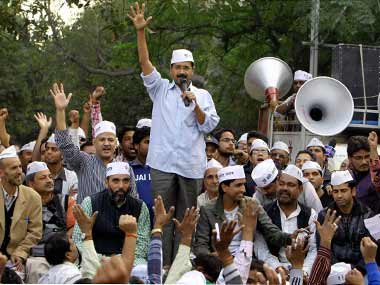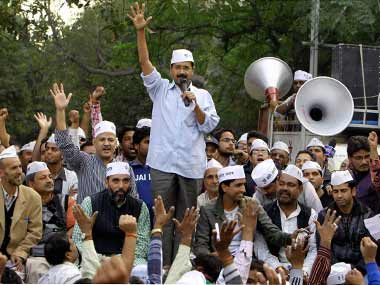It was the big issue that kick-started the Aam Admi Party’s political campaign in Delhi earlier this year. Launching a no-holds-barred attack, Arvind Kejriwal in one of his trademark press conferences in February accused Chief Minister Sheila Dikshit of colluding with private power distribution companies to keep electricity tariffs high despite a dramatic fall in distribution losses. Kejriwal with his ‘bijli-paani satyagraha’ not only forced Dikshit to defend her government’s actions but also succeeded in capturing the public’s imagination with his dramatic protests, which included setting fire to electricity bills and restoring power to households which refused to pay. And there was little the BJP could do except watch helplessly as the young party stole their show and made the bijli issue their own. All this effort may, however, come to naught. Despite AAP’s high-decibel campaign and recent polls that show electricity tariffs as being high on the agenda of voters, most election watchers say that bijli will not determine the outcome of the December 4 elections. [caption id=“attachment_647333” align=“alignright” width=“380”]  Will Kejriwal get the support he expects? PTI[/caption] “At the beginning of the campaign it was an issue. But right now, it is not. There are other issues that have come up… And as we get closer to December 4, I don’t think it will be an issue. But price of essentials will remain a factor particularly with certain section of voters,” says Bhaskara Rao, founder-chairman of the Centre for Media Studies. While electricity figures among the top five issues in almost every state in India, says Rao, it is not sufficient to swing votes. “It helps to launch a campaign but actually in terms of voter behaviour it becomes part of a package. If something else is not going well, it adds to that.” Asked if the opposition’s political campaign has at the very least made bijli a bigger issue than it was in past elections, Rao says, “It started off like that. But it has petered out as an independent issue.” So why isn’t a basic commodity like electricity a key factor in elections? Psephologist and Centre for the Study of Developing Studies (CSDS) professor Sanjay Kumar explains. “When people cast their vote, issues that concern them in their day-to-day life become very important. People are not concerned by Ram mandir or by corruption. More than that, it is the issue of price rise that concerns them in their everyday life.” Increases in electricity rates may seem to be one such daily concern, but they are not important enough to shift voting behaviour, says Kumar. “Bijli is also an issue that comes in that category but it is not a game-changer. It can’t be a game changer in the sense that there are people for whom even if the price of electricity goes up it doesn’t affect them too much. While it is an issue for those who live jhuggi-jhopdis, for whom an increase of Rs 50- 100 makes a huge difference, it is not an issue for the upper and middle-class voter.” Kumar points out that electricity as an issue has never influenced elections in Delhi. “Parties take up these issues but as an election issue when you ask voters on which issues they voted, hardly anyone would say they voted on the issue of electricity being costly. They might say unemployment, for example, but people are not going to say that voting consideration was based on rise in electricity tariffs.” But whether it affects voting behaviour or not, how bothered by hike in electricity tariff are Delhi’s voters? Rao points out that today power cuts in Delhi are not an issue like they used to be in the past. “The point I am making is that there is some improvement somewhere and some dissatisfaction elsewhere. The price has gone up but the quality of supply has improved.” Defending the Dikshit government, spokesperson for the Delhi Congress Alok Sharma takes a popular party line: “As far as electricity tariff is concerned, Delhi has one of the lowest tariffs compared to the BJP-ruled states. I think there has been a lot of improvement as far electricity is concerned. I don’t think it is an issue as far as voters are concerned.” Asked how the Congress party plans to counter the opposition’s bijli campaign, Sharma says, “We are challenging it on facts, on the basis of comparisons with the kind of rates and services there are in BJP-ruled states. They are claiming that they are going to reduce tariff by 30 per cent, we want to ask them how they are going to do it. Why don’t they start by reducing tariff wherever they are in power?” But Vijender Gupta, the former Delhi State BJP chief who is contesting against Dikshit from the New Delhi constituency, insists bijli is a “big issue” in this election and could be a major plank of his election campaign. Says Gupta, “The public are annoyed and are against this hike. The last two years have seen a phenomenal increase in electricity rates. It will be a major issue in election because electricity bills have become unbearable. When the government responds to people’s protests against high electricity bills by asking them to cut down on their electricity usage, it shows how arrogant the government has become.” Asked whether the hike in electricity affected the poor more than it did residents of New Delhi constituency, which is dominated by government employees, Gupta said, “Almost 40 per cent of the central government and NDMC (New Delhi Municipal Council) are Class IV employees and they are badly affected because they are a fixed income group, they belong the to lower-middle class. They are not able to meet their day-to-day needs. The most affected class is the service class.”
Kejriwal with his ‘bijli-paani satyagraha’ not only forced Dikshit to defend her government’s actions but also succeeded in capturing the public’s imagination with his dramatic protests, which included setting fire to electricity bills and restoring power to households which refused to pay
Advertisement
End of Article


)
)
)
)
)
)
)
)
)



